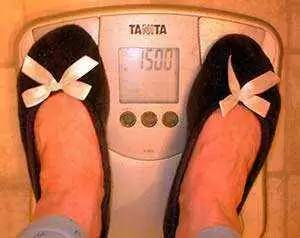Celiac.com 07/10/2006 - Three years ago my father was diagnosed with celiac disease and I was told by my mother that it is hereditary and that I too should get screened for it. I did some research and immediately knew that I had this disease. I wouldn't admit it to anyone at the time because how on earth could I possibly live without pasta and fresh-baked bread for the rest of my life?! You should know that I have been sick for my entire life—I had colic until I was six, got ulcers when I was eight, appendicitis at 14, calcium bone spurs at 17, 19, 24 and 36, infertility at 24, gall stones at 37—just to mention a few of the conditions I've had that were likely related to my untreated celiac disease.
About six months later I decided to go see my doctor—I was in a severe state of depression, and I had lost the ability to think—much less talk. Carrying on a full conversation was nearly impossible because of my inability to speak in full sentences. I was extremely sick with a severe cold, and I had an infection or the flu at least once each month for the preceding two to three years. I told my doctor that I thought that he should test me for celiac disease. Since I weighed in at over 300 pounds he literally laughed at this idea. According to him there was absolutely no way that I could have celiac disease—because I was fat!
Celiac.com Sponsor (A12):
Shortly after that my parents came to visit and tried to talk me into eating gluten-free—at least during the time that they were here. I agreed because I had to cook gluten-free for them anyway. Within three days of starting a gluten-free diet I felt like a million bucks. My depression lifted and within a month I was losing weight and my brain started working again. I have been gluten-free for three years now—not only do I feel like a million bucks, but I have lost over 100 pounds. I shudder at the idea that I was literally eating myself to death—and it was not because I didn't have any will power or that I was eating bad food—it was because my body couldn't process and absorb the food that I was eating. My personal experience, combined with my research, has left me completely convinced that celiac disease is (and will continue to be) a significant cause of obesity—and that this will continue to be the case until there is a better understanding of the disease and its relationship to obesity.
What is Celiac Disease?
Celiac disease is a permanent intolerance to gluten(1), which is a protein found in, wheat, rye, and barley. When gluten is ingested the digestive system is unable to properly break it down, and an autoimmune response is triggered in the gut that causes the villi of the small intestine to become damaged—leading to malabsorption of crucial nutrients. There is no cure, and the only way to control it is through a 100% gluten-free diet.
The disease has a vast array of symptoms, and it is rare that two people will exhibit the same ones. Some will have diarrhea while others will have constipation, and some will not have either but instead may have osteoporosis, diabetes, headaches, fatigue, autoimmune thyroid disorder or any number of other conditions and symptoms found to be associated with it. In many cases these symptoms are associated with the inability to gain weight—children with celiac disease are often small and fail to thrive(1).
Nearly every source that I consulted for this paper referred to malabsorption and how most people with celiac disease lost weight or couldn't gain weight. Only a few sources even mentioned obesity—and when they did it was only in passing. As celiac disease awareness steadily increases and more research is done on it hopefully it will become apparent that many cases of obesity are also related to it.
The Common Thread
Autoimmune thyroid disease has recently been linked to celiac disease. Recent research has demonstrated that 3.4% of patients with autoimmune thyroid disease also have celiac disease2. The thyroid gland secretes hormones to control the body's metabolic rate3, and to accomplish this it must have iodine. When celiac disease is present along with autoimmune thyroid disorder, the body does not have the ability to absorb the iodine to produce the necessary hormones. Additionally there are many different disorders such as obesity, diabetes, allergies, weight-loss, gastrointestinal problems, etc., that can be caused by having a damaged or compromised thyroid gland3 (all of these disorders, by the way, can be related to celiac disease). It has been known for years that obesity has been linked to thyroid problems, and that the thyroid produces 5-monodeiodinase, the body's natural method of conserving fuel during shortage," and the body "elicits the same physical reaction as famine," which can then cause the affected person to gain weight3.
Another disorder commonly associated with celiac disease is malabsorption, which can also lead to malnutrition. When someone with celiac disease eats foods that contain gluten it results in damage to the surface of the small intestine and destruction of their nutrient-absorbing villi. This can lead to leaky gut and an inability for them to absorb vital nutrients from their food. By continuing to eat foods containing gluten, eventually vital organs including the brain, thyroid, liver, kidneys—essentially any organ that depends heavily on nutrients—will be starved, which will leave them susceptible to other diseases and conditions. I personally experienced brain malfunctions, gall bladder problems, and was diagnosed numerous times with an under-active thyroid. Naturally treatments for this proposed thyroid condition didn't work because their true cause had not yet been found. At one point a doctor asked me to consider the idea that my obesity was the result of my body's attempt to cope with malnourishment4. This phenomenon is similar to yo-yo dieting, where dieters who have deprived themselves or proper nutrition for too long gain weight at faster rates than non-dieters after they resume eating normally. I always thought that I had fallen victim to yo-yo dieting, and that I had dieted myself into a permanent state of obesity. I now understand that it was because I had undiagnosed celiac disease, and my body was actually malnourished.
Under normal nutritional conditions humans only absorb about 80 percent of the nutrients from the food they eat, and the rest of the nutrients pass through the body4. With celiac disease, however, the body is unable to absorb the necessary nutrients, which causes some peoples bodies to become a super-efficient machine that begins storing as much fat as possible in order to survive. This nutrient deficiency convinces the body that it is starving to death, which sends it into starvation-mode. Since humans need a certain percentage of body fat reserves to stay alive—and because it takes more work for the body to burn fats than carbohydrates—a body that is in starvation mode tends to crave carbohydrates and more efficiently convert them to fat for later use4.
There has been much research that links celiac disease to diabetes. Diabetes occurs when the body's cells are unable to absorb enough blood sugar5. Although the cause is different, the resulting malabsorption is similar to that seem in celiac disease—although in the latter the malabsorption is not just limited to sugar. The connection between diabetes and celiac disease as described by Marschilok:
"Both diseases have genetic and environmental origins. This means an individual is more at risk of developing either problem when a close relative also has it. On the genetic side, development of one reveals the pre-existing and larger risk that the genes for the other may be present. At least two genes and gene locations are connected with each disease. One gene for each disease is near one gene for the other on the same chromosome. Nearby genes are more likely to pass together to offspring."
However, while the genes are necessary, they are not sufficient to produce the diseases. On the environmental side, researchers know gluten is needed to produce celiac disease, but they also know its not the only environmental cause. With diabetes, the environmental causes are being extensively studied for prevention and cure. Roughly ten percent of celiacs either have Type I diabetes or might develop Type II diabetes6 .
An astonishing 40% of people with diabetes are also obese—even though there was not very much in the way of medical research to indicate why this is so. Diabetes is described as your cells inability to produce or absorb insulin, which leads to an excess of sugar in the blood stream7. If a person injects or produces too much insulin it will increase the level of hunger and cause obesity. I personally find this information disturbing as there are some in the medical community who still blame obesity on character flaws—I cant begin to tell you how many times I have been told: if you just didn't eat so much you wouldn't be fat.
A number of overweight and obese acquaintances of mine have asked me how I managed to lose over 100 pounds and look so healthy while doing it. I explained my celiac disease diagnosis and gluten-free diet to them, and how the diet has made me not feel hungry for the first time in my life—due to the fact that I am now absorbing nutrients properly. Six of these extremely obese people have actually gone to their physicians to get tested for celiac disease—and each was met with the same skepticism as me. They persisted and finally got their doctors to perform the necessary tests—and to the surprise of all each were diagnosed with celiac disease! Immediately after going on the gluten-free diet they all experienced a decrease in hunger and massive weight-loss. For the first time they were eating only when their bodies were truly hungry, instead of eating too much due to starvation signals caused by malabsorption.
This could also be part of the reason that high protein, low carbohydrate diets work so well for many people. By removing the carbohydrates from ones diet you generally remove a large portion of the gluten as well, which can cause those with celiac disease who are obese to lose weight quickly—at least for a month or so. However, on the high protein diet you are still not removing all gluten which will eventually cause them to gain the weight back—even though they are still on the diet. This was my experience with the low carbohydrate diet, and I suspect that a lot of others who are obese and have undiagnosed celiac disease had or will have the same experience.
Conclusion
I once had a family member literally yell at me about my weight and ask me why I was being so selfish and not thinking about my husband and daughter—they told me that I should just lose the weight. I was devastated, I truly had tried every diet on the face of the earth and each and every time I would loose 20-30 pounds quickly (regardless of the type of diet), only to gain it back (while still following the program)—sometimes as much as two fold! Since being diagnosed with celiac disease three years ago I have not only lost the weight but I have also kept it off, and each week a little bit more comes off. I am completely convinced that celiac disease does and will continue to be a common cause of obesity until the medical community—through scientific research—realizes that there is a connection.
Many obese people might not be overweight if they were just properly diagnosed and treated. Certainly it is not the case that all obese people are that way because they just plain eat too much and do not have any will power. I suspect that there are better medical reasons to explain most cases of obesity, and celiac disease is just one of them. Not too long ago it was estimated that celiac disease only affected 1 in 10,000 Americans8. That figure was then revised to 1 in 5,000, and now, after much research, it is at least 1 in 133. The actual diagnosis rate, however, is only about 1 in 5,000, which is only a small fraction of those who have it. Similarly, the causes of obesity in America are not fully understood, and more research needs to be done to determine just how many cases of obesity are caused by untreated celiac disease. I believe that a significant percentage of obese people have undiagnosed celiac disease, and that celiac disease screening should be part of ordinary blood workups for all obese people.
References:
- Adams, S. (May 2005). A Celiac Disease and Gluten-Free Resource since 1995. Retrieved May 18, 2005, from www.celiac.com.
-
Collin, Kaukinen, Valimaki & Salmi, (2002). Endocinological Disorders and Celiac Disease, Endocrine Reviews (pp 1-38).
3. Life Extension, Thyroid Deficiency, Online reference for Health Concerns. Retrieved May 26, 2005 from www.lef.org/protocols/prtcls-txt/t-prtcl-104.html. - Balley, L. (June 2004) Obesity in Developing Countries Compares to U.S. Yo-Yo Dieting. Retrieved June 16, 2005 from: eurekalert.org
- Katz H., (2005). Hope for Obesity and Diabetes. Retrieved June 19, 2005. From: reporter-archive.mcgill.ca
- Marschilok, K., (1997). Diabetes and celiac Disease. Gluten-free Living.
- Hoover, J., (2001). Obesity Causes Diabetes–Fat Chance! Diabetes Health Magazine. Retrieved June 19, 2005 from diabeteshealth.com
- Vogren, C.L., (September 15, 2003). Awareness Can Be Best Medicine: Parents who lost son to celiac disease want to shed light on often-overlooked ailment. The Gazette. Retrieved June 19, 2005 from csaceliacs.org.










Recommended Comments